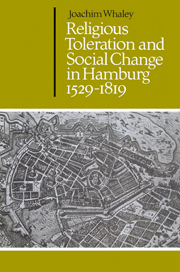Book contents
- Frontmatter
- Contents
- Preface
- Abbreviations
- Illustrations
- Introduction
- 1 The struggle for political stability and purity of belief: Hamburg from Reformation to French Revolution
- 2 The politics of toleration: the Catholic community
- 3 The limits of toleration: Sephardim and Ashkenazim
- 4 The growth of toleration: the Calvinist communities
- 5 Patriotism versus Orthodoxy: the struggle for limited religious freedom, 1760–85
- 6 The image of the city: the search for a tolerant society in early modern Hamburg
- 7 The aftermath
- Bibliography
- Index
- Frontmatter
- Contents
- Preface
- Abbreviations
- Illustrations
- Introduction
- 1 The struggle for political stability and purity of belief: Hamburg from Reformation to French Revolution
- 2 The politics of toleration: the Catholic community
- 3 The limits of toleration: Sephardim and Ashkenazim
- 4 The growth of toleration: the Calvinist communities
- 5 Patriotism versus Orthodoxy: the struggle for limited religious freedom, 1760–85
- 6 The image of the city: the search for a tolerant society in early modern Hamburg
- 7 The aftermath
- Bibliography
- Index
Summary
In his Dichtung und Wahrheit Goethe recalled how as an aspiring young writer he had practised his literary skills by drafting a pamphlet in the form of a letter from a rural parson to a newly ordained colleague: ‘The main theme of this letter was the watchword of that time, namely, “Tolerance”, which prevailed among the better minds and spirits.’ His immediate inspiration was the work of his uncle Johann Michael von Loen, one of the most prominent German polemicists of religious toleration; but his youthful exercise reflected one of the major preoccupations of the age. For, as contemporaries constantly pointed out, the eighteenth century was the century of toleration. United in their rejection of persecution and discrimination on grounds of faith, the Aufklärer saw the propagation of mutual recognition and respect as their prime vocation.
Even the most cursory survey of enlightened literature reveals just how fundamental the idea of toleration was to the Aufklärung. Sermons, travel reports, historical works, topographies, encyclopedias, studies of population growth and the economy, plays, poems and novels, all are littered with references to the evils of religious persecution and the beneficial results of an irenic pacificism. The writings of Bayle, Locke and Voltaire became the devotional literature of a new cult of humanity which condemned the brutality of the Old Testament.
- Type
- Chapter
- Information
- Publisher: Cambridge University PressPrint publication year: 1985



